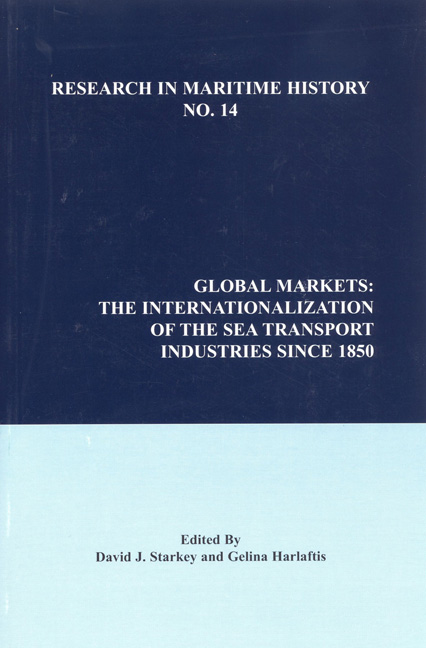Book contents
- Frontmatter
- Contents
- About the Editors
- Contributors
- Introduction
- “International Freight Markets in the 1830s and 1840s: The Experience of a Major Finnish Shipowner”
- “The First (and Very Secret) International Steamship Cartel, 1850-1856”
- “Competition or Co-operation in the Global Shipping Industry: The Origins and Impact of the Conference System for British Shipowners before 1914”
- “National Alliances and Global Webs: The Internationalization of Japanese Shipping”
- “Dutch Sea Transport in Transition: The German Hinterland as Catalyst, 1850-1914”
- “The Expansion of American Interests in Transatlantic Commerce and Trade, 1865-1893”
- “The Expansion of Japan's Shipping Interests before the Sino-Japanese War”
- “Cooperation and Reorganization on the North-South Routes from Japan in the Interwar Period”
- “The Global Communications Industry and Its Impact on International Shipping before 1914”
- “The Nineteenth-Century Roots of Globalization: Some Technological Considerations”
- “The Global Fish Market: Internationalization and Globalization, 1880-1997”
- “Convergence or National Styles? The Japanese Challenge to the British-Norwegian Hegemony in the Twentieth-Century Whaling Industry”
- “International Trends and Greek Shipping: The Business Strategy of Demetrios Moraitis, 1893-1908”
- “Organizational and Managerial Patterns of Greek- Owned Shipping Enterprises and the Internationalization Process from the Internar Period to 1990”
- “Internationalization and the Collapse of British Shipbuilding, 1945-1973”
- “Globalization and International Competitiveness: The Experience of the Japanese Shipping Industry since the 1960s”
- “Containerization and the Globalization of Liner Shipping“
Introduction
- Frontmatter
- Contents
- About the Editors
- Contributors
- Introduction
- “International Freight Markets in the 1830s and 1840s: The Experience of a Major Finnish Shipowner”
- “The First (and Very Secret) International Steamship Cartel, 1850-1856”
- “Competition or Co-operation in the Global Shipping Industry: The Origins and Impact of the Conference System for British Shipowners before 1914”
- “National Alliances and Global Webs: The Internationalization of Japanese Shipping”
- “Dutch Sea Transport in Transition: The German Hinterland as Catalyst, 1850-1914”
- “The Expansion of American Interests in Transatlantic Commerce and Trade, 1865-1893”
- “The Expansion of Japan's Shipping Interests before the Sino-Japanese War”
- “Cooperation and Reorganization on the North-South Routes from Japan in the Interwar Period”
- “The Global Communications Industry and Its Impact on International Shipping before 1914”
- “The Nineteenth-Century Roots of Globalization: Some Technological Considerations”
- “The Global Fish Market: Internationalization and Globalization, 1880-1997”
- “Convergence or National Styles? The Japanese Challenge to the British-Norwegian Hegemony in the Twentieth-Century Whaling Industry”
- “International Trends and Greek Shipping: The Business Strategy of Demetrios Moraitis, 1893-1908”
- “Organizational and Managerial Patterns of Greek- Owned Shipping Enterprises and the Internationalization Process from the Internar Period to 1990”
- “Internationalization and the Collapse of British Shipbuilding, 1945-1973”
- “Globalization and International Competitiveness: The Experience of the Japanese Shipping Industry since the 1960s”
- “Containerization and the Globalization of Liner Shipping“
Summary
…exuberant energy, wealth, power and arrogance… propelled Europeans into all corners of the globe and by the mid-nineteenth century created a single world-wide economic and maritime system.
The internationalization of the world economy has been one of the defining characteristics of the nineteenth and twentieth centuries. A direct result of European expansionism and industrialization, this process has been facilitated by, and has stimulated, profound improvements in transportation and communications. While revolutions in land, air and sea transport have played a significant part in extending the scope of economic activity, remarkable advances in the means of information dissemination have greatly expedited the flow of intelligence and data upon which the business decisions of producers and consumers are based. Due to such developments, the world has become smaller in a metaphorical sense; but, at the same time, the spatial expansion of the world's commodity, labour and capital markets has been such that they have become literally global in extent.
Global Markets is concerned with the part that the sea transport industries have played in this process. Such a subject area provides an excellent vantage point from which to examine the emergence and development of the international economy, for the sea transport industries, by their very nature, are both intrinsic to, and influenced by, the economic and political interactions between nations. Accordingly, studies of shipping and shipping-related activities provide insights into the nature of phenomena which are labelled, often very imprecisely, “internationalization“ and “globalization.” The former is directly derived from the concept of the nation state, though it implies rather more than the simple exchanges between bordering states that the term “international” might be taken to mean. Instead, internationalization implies a process of becoming, an ongoing evolution entailing the emergence of multilateral, spatially dispersed and regular links between nations. This gradual process is well illustrated by the pace and pattern of the geographical spread of shipping routes from the mid-nineteenth century (see Wray's chapter). “Globalization” is more contentious. While not all observers accept the validity of the concept, some arguing that if anything it forms simply a phase in the internationalization process (Johnman), those who view it as a distinct phenomenon offer different interpretations as to its meaning, scope and location in an historical context (Greenhill, Scholl, Jarvis, Goto).
- Type
- Chapter
- Information
- Global MarketsThe Internationalization of The Sea Transport Industries Since 1850, pp. ix - xviiiPublisher: Liverpool University PressPrint publication year: 1998



